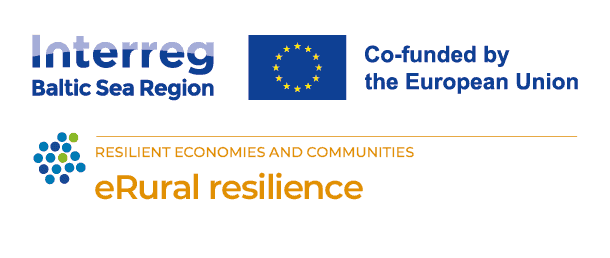
The eRural resilience project empowers rural communities to develop sustainable bio-based solutions for economic growth and resilience.
27 March 2024
Bioeconomy is one of the most important economic sectors in Europe which significantly determines the development of rural areas and plays a strategic role in achieving EU climate goals.
According to Sven Tobreluts, the CEO of The Association of Municipalities of Tartu County and the lead partner, there is still a lot of unused potential in bio-sector, both in terms of valorisation of biomass and the innovation readiness of bio-businesses.
The bioeconomy offers rural areas a means to diversify their economies beyond traditional sectors like agriculture and forestry. By fostering bio-based industries such as bioenergy and biorefineries, rural communities can create new jobs and stimulate innovation. According to Dorota Tekieli- Bisińska, Director of The Staropolska Chamber of Industry and Commerce, the development of the bioeconomy sector is essential for rural areas, aligning with the EU Green Deal’s goals by offering economic diversification, sustainable resource management, and climate change mitigation through circular economy principles and promotion of bio-based industries like bioenergy and sustainable agriculture. In addition, it emphasizes the responsible use of biological resources through practices that contribute to the conservation of biodiversity and reducing carbon emissions.
The cooperation project of the Baltic Sea countries “eRural Resilience” provides to the target groups, rural local authorities and business promotion centres, a complex solution to promote and support bio-business sector (SMEs and individuals) development in rural areas.
„The “eRural resilience” project offers tailor-made activities to support bio-businesses in rural areas, including identifying and mapping natural resources, analysing local environmental conditions, and promoting entrepreneurship through mentorship and access to best practices. By building a supportive ecosystem and fostering collaboration among stakeholders, the project aims to empower rural communities to develop sustainable bio-based solutions for economic growth and resilience,” said Dorota Tekieli- Bisińska.
In the first project stage, in 2024, the methodology for assessment of e-bio-business supporters and the methodology for supporting e-bio-business launching will be developed.
In the second stage, in 2025, assessment tools and e-bio-business supporting roadmap will be tested and piloted. A consortium of partners analyses 200 companies or entrepreneurs and supports 60 companies in their moving into e-bio-business.
Additionally, two transnational knowledge hubs – Bio-Knowledge Hub and Digitalization Hub – will be created to provide wide-range of expert knowledge and advice to bio-businesses in rural areas, involving sectoral experts from different regions.
“Within the eRural resilience project, we have a very good opportunity to bring the importance of bioeconomy into focus in different regions by providing professional expert support, developing regional knowledge-based networks and encouraging bioeconomy companies to product development. The development of bio-entrepreneurship is fostering innovation in a variety of industries, creating new jobs and economic growth opportunities, especially in local communities and rural areas. Our goal is to empower regions and implement this potential through a high-quality support service“, added Sven Tobreluts.





